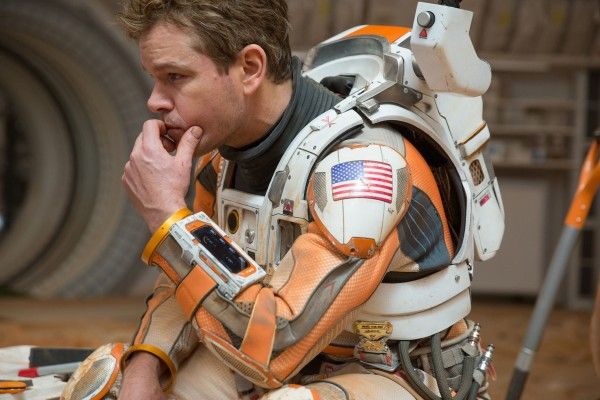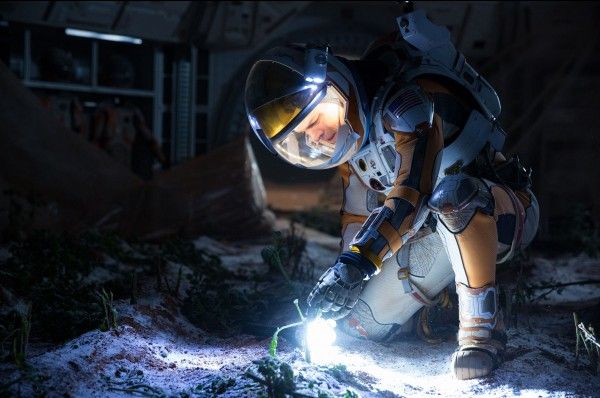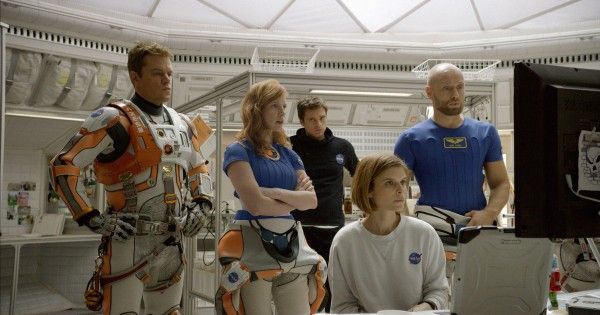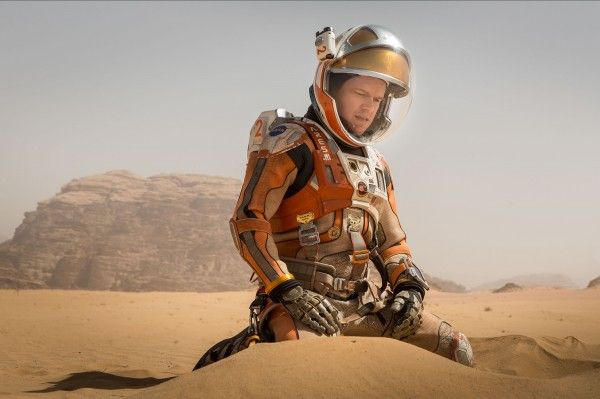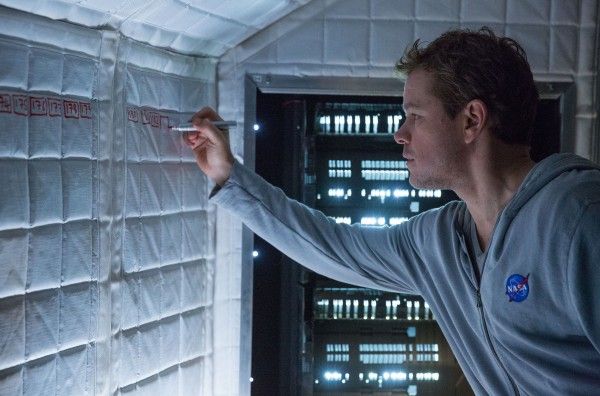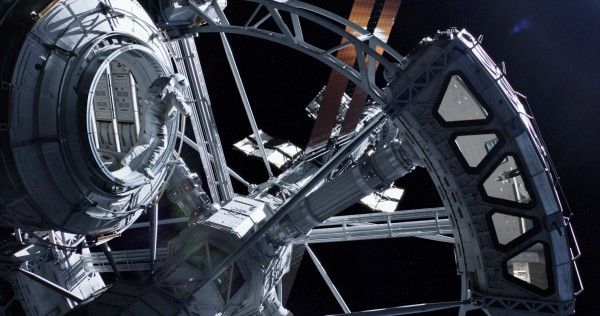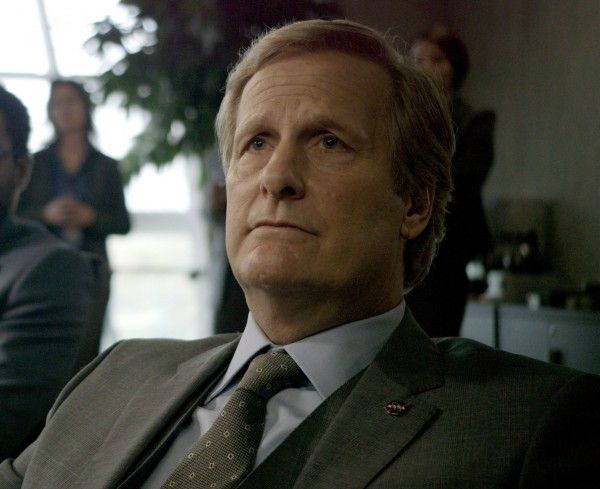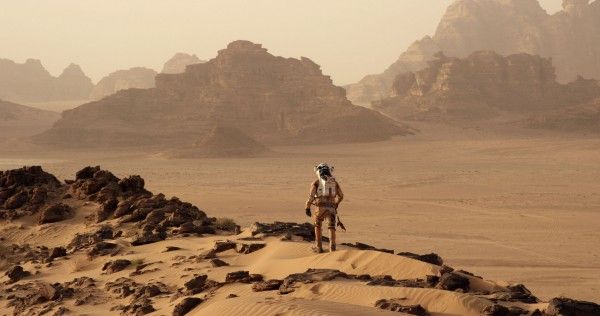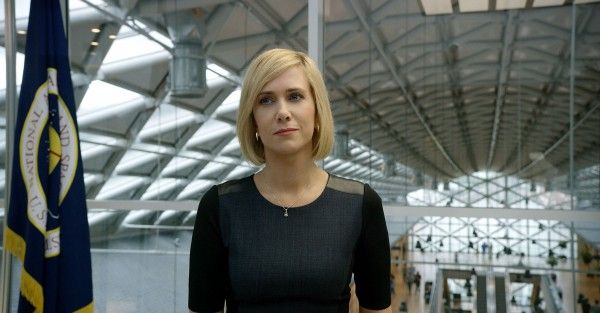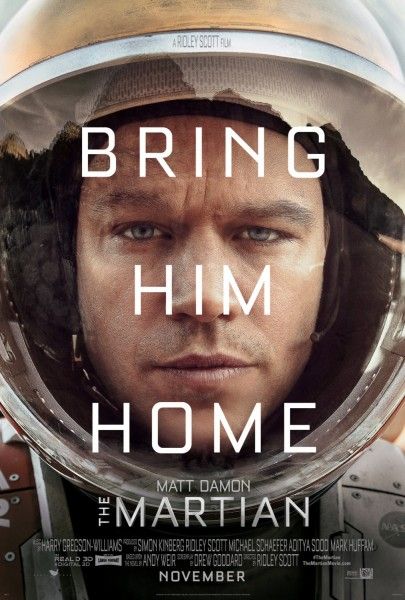One of the many things I love about Matt Damon is his infectious charm and easy-going attitude. While he’s one of the biggest movie stars on the planet, he never acts like one. He’s always grounded and honest, willing to answer anything with a smile.
Last year when Ridley Scott’s The Martian was filming in Budapest, I got to visit the set with a few other reporters. If you aren’t familiar with the material, the film is based on Andy Weir’s self-published 2012 novel of the same name, and revolves around an astronaut who finds himself stranded on Mars after he is injured and presumed dead by his team. With limited resources and a finite amount of time before his oxygen runs out, Mark Watney (Matt Damon) must use the power of science to keep himself alive on the red planet and find a way to let NASA and his team know he’s still alive. The film also stars Michael Pena , Jessica Chastain, Sebastian Stan, Aksel Hennie, Kate Mara, Jeff Daniels, Chiwetel Ejiofor, Sean Bean, Kristen Wiig and Donald Glover.
During a break in filming, I was able to participate in a group interview with Damon. During the wide-ranging conversation he talked about what makes The Martian different from the other Mars-set movies, why he was hesitant to do it after Interstellar (and Scott's blunt reaction to his concern), Scott's infectious passion for filmmaking, the massive sets, why he took off so much time from working, and so much more. It’s a great interview.
But before checking it out, if you haven't seen the great looking trailer, I'd watch that first:
QUESTION: How are you doing?
MATT DAMON: Good, good. You’ve rescued me from Mars for the moment. Have you guys been in to see it?
Yeah, yeah. It’s insane in there.
DAMON: It’s the biggest movie I’ve ever been on.
You got the script at 7pm on a Friday and the following morning by 6 or 7 you had already committed. Is that pretty accurate?
DAMON: Well the first iteration of this was with Drew Goddard directing it. And I didn’t know Drew, so I met and talked to him and right after I was just about to make the decision about ‘alright, well, do I go with this newer director?’ But I really like him a lot, and got along with him right away, so I was gonna do it with Drew. And then suddenly he got Sinister Six, and he was like ‘this is my dream!’ He’s a big comic book guy so he took that, and I said ‘okay, well I guess the movie’s dead’, and I hadn’t worked in a year and a half and I was pretty calm about it. And then I got the call that it was Ridley [Scott]. And I had literally never met Ridley, never even in passing at a thing or anything. So I went into meet him, and then that was the thing that happened really quickly because I went in to have this meeting him and the first thing I said was ‘my only hesitation is, I love this script, but I just did Interstellar and I played a dude who like was stranded on a planet by himself, and it might be weird if I take a year and a half off and then play a dude stranded on a planet.’ And I explained the movie to him and he was like ‘the movies are totally fucking different. This is gonna be fucking fun. Let’s do this!’ It’s kind of that infectious thing…I couldn’t really say no to him.
So was that year and a half off by accident or intentional?
DAMON: The first six months was intentional because we moved from New York to LA, so just to be around the kids for that transition I took time off. And then I couldn’t find anything that I wanted to do. I mean you see what’s out there…it’s tough. The movies that have really been my bread and butter for twenty years, they don’t make them anymore. They really don’t. It’s really very hard to get the money together. A lot of that stuff is migrating to television. They’re more apt to take a huge risk on a high concept idea than on a kitchen sink drama or something. When this came along, I went ‘how many of these movies will I be able to really do that I’ll like, that are original and aren’t just a knockoff of something else?’
Speaking of risk, previous Mars movies have struggled a little bit to find an audience. Was that a concern to you, and what makes this different?
DAMON: I don’t think there are enough Mars movies to make it a genre [laughs]. I haven’t even thought of that until you said that, so hopefully we’re making the definitive Mars movie, at least for now. Yeah, I didn’t even think of that.
What makes this different from stuff like Mission to Mars, John Carter, Red Planet, all of those movies?
DAMON: One of the biggest differences is that it’s primarily me on my own for a lot of it, and that’s a big challenge. It’s got all the bells and whistles of NASA and the whole B-side of the story is the rest of the world trying to get this guy back, but the other half of the movie is me and Ridley on Mars [laughs]. So that part’s different, and you start there. It’s this kind of mystery, what happened? How’d he get left there? And the mission part is that B-side, trying to figure out how to get back, so I think structurally it’s pretty different than any of them that’s ever been done.
How do you sort of graph for your arc being that it’s just you alone without another actor there to really reference off of?
DAMON: Ridley really talks in terms of how he’s cutting the movie; he’s cutting it while we’re filming. I was saying yesterday that he reminds me already of [Steven] Soderbergh or [Steven] Spielberg in the way that they’re cutting the movie as they go. So if you ask a question, he goes ‘no no, I’m going to be on your face at this point’, so you can’t get lost as an actor. You know exactly the movie that you’re in at all times, so there’s no hocus pocus, it’s not like ‘don’t worry, you’ll know in a few months.’ He’ll tell you exactly what this shot is and what the next shot is gonna be, and what two shots after it are gonna be. He gives you the storyboards so you can actually flip through it like a comic book. In terms of graphing where you’re at it makes your job a lot easier. And then he’s watching the whole time. If there’s something that’s off, you do variations within a zone, but you kind of know the zone because he’s made that so clear.
And how would you describe that arc? Does he go a little buggy?
DAMON: No, it’s interesting, that was one of the things in the book. It’s an adaptation of this book, and that’s one of the things that was pointed out by a lot of reviews of the book, that it’s not kind of this existential movie about desolation. You could make that, but I think you probably couldn’t make that at this scale. This character is this incredibly resourceful, optimistic person who just doesn’t bother whinging about things. He just thinks ‘what’s the next problem? Okay, what’s the next problem? I just have to keep knocking down problems in order to stay alive’ because there are so many things…he’s on the very edge of death at all times. If the oxygen tank breaks, he’s gonna die. If the water tank breaks, he’ll die of thirst. If there’s a breach in the half, he’s gonna implode. If all of that works, he’s gonna starve to death. He’s like ‘there are so many things to do’, that his days are full just trying to…and the writer of this book, this guy Andy Weir. I have not talked to him but I read an interview with him. He was talking about how he came up with the concept. He’s like a scientist, he just let the science dictate what would happen if this were me. And he sat there and did it as this kind of thought exercise, ‘well I would need to do this and I would need to do that, and okay well then I would need to do this.’ It’s a very smart person procedurally doing what they need to do to stay alive on Mars. Hopefully people want to see that [laughs].
I was going to ask about the hard science. How much as an actor do you need to understand that? How much did you research?
DAMON: Not at all. You can if you want to, but it’s acting. If it’s done right, the audience should believe it. I think it’s always good when an actor knows what they’re saying. You can see when you watch an actor who’s talking and he literally doesn’t have any idea what they’re talking about, that comes across. But if you know in general terms what it is and what the obstacles are, then you don’t have to know. Like Interstellar, even Chris Nolan wasn’t learning about the kind of physics…he had physicists there kind of as a technical advisor so there are experts around that you can work with. And also you see those stories about actors all the time like ‘he could’ve tried the case in front of the supreme court, he was that good!’, and you’re like ‘fuck off’. It takes a lifetime to learn whatever you’re doing, whatever your trade is, it’s hard and it’s really demeaning to any of these people to say ‘oh, this guy researched it for three months so now he could be an astronaut’. It’s like ‘yeah, right’. Maybe a journalist, but…
There’s a lot of humor in the book, a lot of sarcasm. Can you talk about how that translates into the movie, and what Mark’s like as a character to play?
DAMON: A lot of that stuff, those monologues are taken right from the book. And in that part I do believe that these guys do have that kind of gallows humor and a good sense of irony. Anybody I’ve met who has some occupation that’s kind of cheating death all the time, they tend to have that kind of gallows humor and sarcasm. If we get it right, the movie should be funny too without losing a sense of what the stakes are.
Can you talk a little bit about Mark himself, how he is as a character to play?
DAMON: He’s a lot like me. No, when I first read the script, the humor that you’re referring to is what I really…I was openly laughing at a lot of points. The trick is tonally, you can’t make it glib because among everybody and everybody trying to rescue him because of what’s at stake, it’s very, very serious. But it can still have that humor, so I see him as this very funny but very, very smart guy, which is something I talked to the writer about, Drew. He described it as a love letter to science, that’s how he saw this. And this celebration of science and human ingenuity, and that’s really what moves us forward are people like that who are willing to take those risks and potentially sacrifice themselves, but are really actually interested in the unknown. I have no interest in the unknown. I said yesterday ‘I wouldn’t have been a pioneer or anything. I would have stayed on the east coast. Off you go, tell me what it’s like. I have a warm fire here.’
Could you tell us about a scene we saw this morning? It’s quite challenging in terms of the dust storm. What was that like to be in the middle of it?
DAMON: It’s awesome. That’s the biggest stage in the world right there. And the biggest green screen in the world. This is a night scene, so they have it covered up but I walked in a few days ago and just went ‘fuck’. I couldn’t believe the scale, and we’re gonna transport all this to Wadi Rum and put it down, so we’re really gonna be out there. So reading it in the script and going okay…Mars. Exterior. Night. Wind Storm. You’re like, ‘what’s that gonna look like?’ And you come in and you see five of these Ritter fans, that’s as big as they get. It’s like walking in a hurricane. You’re leaning over and they’re throwing all that particulate. Ridley’s going to be put in even more digitally so that he can kind of dial it up and dial it down. It’s basically going to look like the most inhospitable place in the universe, which is great because that’s the moment in which they get separated. I’m reading it and I go ‘how do they get…okay, there was a storm, but what would that look like?’ Looking at that, I totally believe that those guys could get separated in that. It’s worse than the top of Everest, basically.
Talk about how he builds complete universes in the sense of that the Alien world or the Exodus world—to what extent does he articulate the extent of this, and the detail and the kind of layering being used?
DAMON: Yeah, completely. I was here a month, month and a half ago for a week just sitting and going over the script with him every day. And talk it through as if he were shooting it, ‘and then we’re gonna cut from this, and then we’re gonna go from this’. So you have an understanding of that. And all of the crafts people, all of his keys, they’ve been with him forever. Some of these guys have been with him for thirty-five years. You have sidebar conversations with them and their level of detail in their specific field and how granular they can get with what they’re planning on doing; they’ll show you all the drawings, so by the time you arrive, you’ve got kind of everybody’s playbook and everyone kind of opens the kimono and then Ridley’s the arbiter of taste at the end of the day. ‘More of this, less of that, yes, no, fuck off.’ And then you get a Ridley Scott movie.
As an actor, is that method really easy to inhabit? In the sense that you’ve got complete coverage, you’re not redoing and redoing and redoing. Sometimes you’re doing one or two pass throughs with ten cameras around you.
DAMON: That’s great, we love that. Shoot the rehearsal, if anyone screws up, it doesn’t matter, it was the rehearsal. But a lot of times, Ridley and I were just talking about this yesterday, you get something great the first time everything happens. That’s why Clint [Eastwood] never rehearses. He shoots the rehearsals too. I don’t think it’s a mystery why these guys have been making movies for a long time. They like to turn over; you don’t lose anything by doing that.
We saw some storyboards earlier that were amazing, amazing designs of spaceships and so on, very 2001 [A Space Odyssey]. Are you a fan of 2001?
DAMON: That piece of shit?
[Laughs]. How did you feel when you first saw the Mars Rover? That’s kind of amazing.
DAMON: I haven’t seen it in person yet. I’ve seen little videos of it in various stages, but I have yet to see it, so you’ve seen it before me.
Will you have to drive that one?
DAMON: I will. They tell me once you get the hang of it, it’s a joystick. It’s a steep learning curve, so at the beginning I think they have people around to make sure I don’t crash it. But I love 2001.
You’ve worked with some amazing filmmakers and now you’re adding Ridley to the list. Is there a similar trait that all of them have that you’ve noticed?
DAMON: Yes, without a doubt. I’ve said it before because I noticed it probably five, six, or seven years ago. Every single one of them, the ones that we would call master filmmakers, they all are really solicitous of everyone’s opinion around them. All of the people they’re working with, the actors…their key is the people that they rely on, they want every suggestion possible. Clint said to me a few years ago, he goes ‘why wouldn’t I take your suggestion? If it’s good, they’re just gonna give me credit for it.’ And they all do say the whole point of working in a collaborative medium is that you’re collaborating. And it’s still a dictatorship so the director is still totally responsible for what ends up on the screen, but Ridley could have been a painter. But he chose filmmaking because there’s something about the stew of getting people together and collaborating. And he’s still the head of everybody, but there’s something about that way of making something that’s more appealing than just painting by himself.
For more on The Martian:
- Jessica Chastain on THE MARTIAN, Ridley Scott's Female Characters, INTERSTELLAR, and More
- Over 30 Things to Know About Ridley Scott's THE MARTIAN from our Budapest Set Visit


